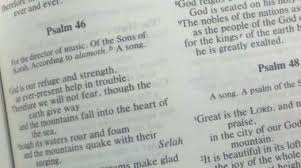"Be Still, and Know That I Am God" -- A Sermon on Psalm 46
 Tuesday, September 9, 2014 at 09:45AM
Tuesday, September 9, 2014 at 09:45AM  A Sermon on Psalm 46
A Sermon on Psalm 46
Most people cannot recite Psalm 46 from memory. But many are so familiar with the words to Martin Luther’s famous hymn “A Mighty Fortress Is Our God” that they can sing it without looking at the bulletin. “Ein Feste Burg ist unser Gott” is actually Luther’s paraphrase of Psalm 46. This Psalm has several very familiar lines, has been cited by American presidents (most recently by Barak Obama), and portions of it appear in well-known Jewish prayers. Found in Book Two of the Psalter and attributed to the Sons of Korah, it is classified as a “Psalm of Zion” and contains loud echoes from Psalm 2, where that divine protection promised to the king, is extended to include his capital city (Jerusalem). Charles Spurgeon aptly speaks of the 46th Psalm as “the song of faith in troubled times.” Martin Luther thought this Psalm of such comfort, he put it to verse.
As we continue with our series on select Psalms, I thought it appropriate to turn our attention to Psalm 46, because we sing this particular Psalm as often as any other–often in the form of Luther’s famous paraphrase. Before we turn to the text of the Psalm itself–where we will find much deep and rich biblical theology–I think it appropriate to consider Luther’s use of this Psalm, then debunk one of the persistent myths surrounding the version of the Psalm which appears in the KJV, and then look at the context in which the Psalm was originally composed. Then, we will look at the text of the Psalm while making various points of application as we go.
As for Luther and “A Mighty Fortress,” although there are many theories about when it was written and for what occasion, Luther’s hymn first appears in a 1531 hymnal which would indicate that Luther wrote it several years earlier, likely in 1527-29. This was ten years or so after his 95 theses were circulated throughout Europe, igniting the theological fire which became the Protestant Reformation. The black plague was especially virulent throughout much of Europe in the winter of 1527, nearly killing Luther’s son. Luther was also a physical wreck during this time (from exhaustion). He began spending much time reading and reflecting upon Psalm 46, especially its promise that God is the bulwark (fortress) who never fails. From Luther’s reflection on that word of comfort, the famous hymn was born.
According to one church historian, “many times during this dark and tumultuous period, when terribly discouraged, [Luther] would turn to his co-worker, Philipp Melanchthon, and say, ‘Come, Philipp, let us sing the forty-sixth Psalm.’” Luther said of this particular Psalm, “we sing this psalm to the praise of God, because He is with us and powerfully and miraculously preserves and defends His church and His word against all fanatical spirits, against the gates of hell, against the implacable hatred of the devil, and against all the assaults of the world, the flesh, and sin.” Because our fathers in the faith were sustained throughout their trials by their knowledge and love of the psalter, we would be foolish to ignore their wise counsel, and the faithful example they have set before us.
To read the rest of this sermon: Click Here


Reader Comments